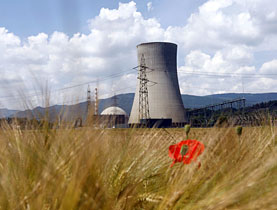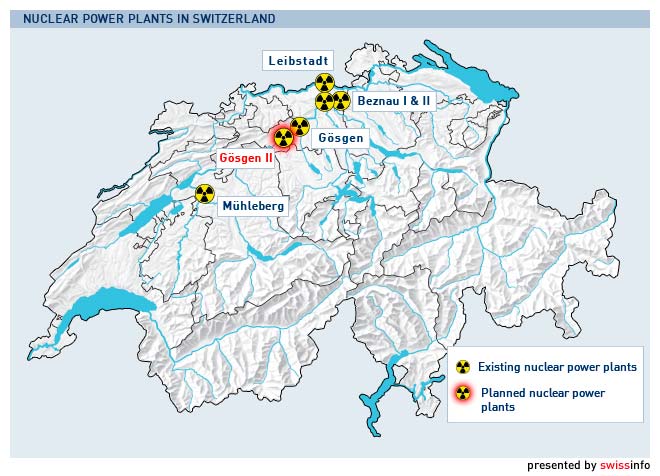
Energy supplier demands new nuclear plant

Swiss electricity company Atel has broken the taboo surrounding new nuclear power plants, submitting an official request to build a facility in canton Solothurn.
Environmental organisations are already threatening to take up the fight against the project, which could go to a nationwide vote for approval.
Atel submitted its demand to the Federal Energy Office on Tuesday, confirming plans it had outlined in March. The company says that a new reactor is needed to cover an electricity shortfall that it expects in the coming years and which cannot be covered by existing sources such as hydro-electric power.
It has already expressed its preference for a site next to the Gösgen reactor in canton Solothurn in northwestern Switzerland, which has been operating since 1979.
According to the company, the site fulfils all the criteria for the construction of a new facility, including available land, proximity to the power grid and water for cooling.
Details outlined
The new reactor would belong to the third generation of power plants, said Atel CEO Giovanni Leonardi. A light water reactor, it would produce up to 1,600 megawatts of power, and would also include a smaller than usual hybrid cooling tower.
Herbert Niklaus, head of Atel’s Swiss energy division, said that the facility would rely on reliable and tested systems, components and equipment. “It will not be a prototype,” he added.
Given that there are no reactors of this type yet in use in Europe, opponents of nuclear power are not reassured by Niklaus’ claim.
“As far as we are concerned, the risks are the same as for today’s reactors,” Jürg Buri of the Swiss Energy Foundation told swissinfo. “Atel is proposing a new type of reactor that has yet to be tested, so we have no real idea how safe it might be.”
The total investment is expected to be up to SFr7 billion ($6.75 billion), a cost that Atel – shortly to merge with western Switzerland’s biggest electricity provider, EOS – will not bear alone. It is looking for partners and is in talks with the operators of other Swiss power plants.
Atel says it also has the support of the authorities, both in the commune of Däniken where the plant would be built and at the cantonal level. Last October, Solothurn’s parliament called on the cantonal government to promote the construction of a nuclear facility in the area.
Apart from a request from the commune not to build a new cooling tower, initial local opposition seems minimal. However, the promoters could eventually face a nationwide vote on whether construction can go ahead.
While Atel says it welcomes a discussion on the “importance of large-scale power stations for future energy supply in Switzerland,” it is likely to face a tough battle with environmental organisations.
Greenpeace says it is a mistake to bet on this energy now.
“It would be better to spend the time and money it would take to build a new facility on developing renewable sources of energy,” spokesman Clément Tolusso told swissinfo.
A long haul
Both opponents and supporters of nuclear power estimate that it will take at least 12 years before the reactor is built. However, the Federal Energy Office believes it could take up to 18 years before the process is completed.
Opponents are preparing to fight the project all the way. The Stop Nuclear Alliance, of which Greenpeace and the Swiss Energy Foundation are members, has already announced it will demand a nationwide vote.
“We are appalled by this decision,” said Buri. “We don’t need a new nuclear power plant. We can have a much safer supply of power from renewable energies and also more efficient distribution of electricity.”
The opponents also point the finger at the cost, claiming that they have been driven up since the original estimates for the project were carried out.
“The cost of nuclear energy is still unclear,” added Buri.
“We don’t know for example how much it will cost to store waste because we have no experience dealing with it. The funds being set aside by the power companies will never be enough for this.”
The fight over nuclear energy promises to get tougher in the near future. Two other power companies, Axpo and BKW Energie, intend to submit requests to replace two ageing reactors at Beznau in canton Aargau and Mühleberg in canton Bern.
swissinfo, Scott Capper
In 1990, Swiss voters approved a ten-year moratorium on new nuclear facilities. The decision came only a few years after the Chernobyl disaster.
By 1998, the government had decided in principle that Switzerland would abandon nuclear power.
But at the end of the moratorium, the pro-nuclear lobby began calling for new plants, saying it would help cut production of greenhouse gases and dependency on fossil fuels.
In 2003, voters rejected two proposals, one calling for a new moratorium, another demanding the end to Swiss nuclear energy.
The nuclear energy law introduced in 2005 confirms that atomic power is not dead, but submits any new projects to a possible nationwide vote.
In February 2007, the cabinet decides to replace existing nuclear power plants and build gas plants to avoid an energy shortfall.
In January, Britain and France confirm that they will build new nuclear facilities. Finland is already building a third-generation facility.
A nuclear power plant is driven by energy that is released through the fission or splitting of an atomic core.
The isotope uranium-235 is the material that is normally split or “burned”. The atomic fuel must contain around 3 per cent of this isotope for the atomic reaction to work.
The process is supported by water that serves as a moderator and also acts as a conductor for the energy produced.
This energy is delivered to heat exchangers where steam is generated in a second cycle which then drives turbines and power generators.
The excess heat is released into the environment into a river, as in Beznau and Mühleberg, or through cooling towers, as in Gösgen und Leibstadt.


In compliance with the JTI standards
More: SWI swissinfo.ch certified by the Journalism Trust Initiative





























You can find an overview of ongoing debates with our journalists here . Please join us!
If you want to start a conversation about a topic raised in this article or want to report factual errors, email us at english@swissinfo.ch.